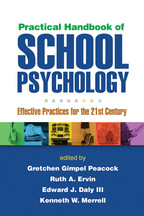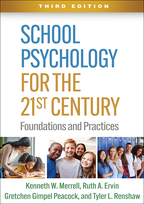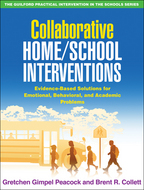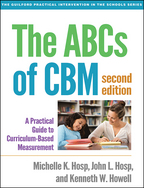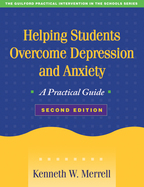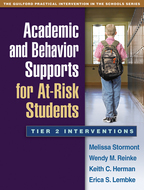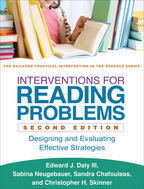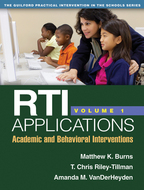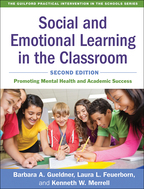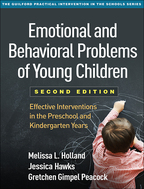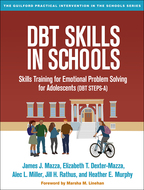Practical Handbook of School Psychology
Effective Practices for the 21st Century
Edited by Gretchen Gimpel Peacock, Ruth A. Ervin, Edward J. Daly III, and Kenneth W. Merrell
HardcoverPaperbacke-bookprint + e-book
Hardcover
orderSeptember 2, 2009
ISBN 9781593856977
Price: $108.00 626 Pages
Size: 7" x 10"
Paperback
orderJuly 20, 2012
ISBN 9781462507771
Price: $72.00626 Pages
Size: 7" x 10"
“The Practical Handbook of School Psychology (PHSP) is a reference that should be in the hands of every school psychologist....It is practical in the sense that it is loaded with useful information about adopting and implementing a problem-solving approach to RTI, from basic concerns to advanced technical features. It is revolutionary in its implications for general education through its documentation of the effectiveness of school-wide, evidence-based practices. PHSP is an edited text. This might turn some people against it, but it should not. The chapters are better organized and integrated than most edited books, so that the volume holds together well as a single work....This book will provide background for those who have only an introductory knowledge of RTI and the problem-solving model. It will provide a stimulating integration of knowledge for those who are more familiar with the RTI/problem-solving process. It will be a welcomed text for school psychology trainers who have previously had to draw from multiple and diverse reference sources to cover such a broad range of material.”

—NASP Communiqué
“An impressive resource on applied research in a small but important field....Highly recommended. Graduate students, researchers, faculty, and professionals.”

—Choice
“This comprehensive book applies the problem-solving model to both academic and social-emotional problems. The authors address topics that are highly relevant for school psychologists who are moving beyond the traditional assessment role, and I was impressed with the breadth and scope of their treatment. The style is concise, capturing the essence of what practitioners need to know and do. The book is appropriate for both graduate students and professionals. Sections and chapters are well organized, making it easy to pinpoint specific topics during practicum and internship classes.”

—Ellie L. Young, PhD, Department of Counseling Psychology and Special Education, Brigham Young University
“The editors have brought together some of the field's best authors to produce a unique resource that will meet the needs of both experienced practitioners and those new to the profession. The Handbook will be especially important for practitioners in the midst of shifting their practice to support response to intervention in general and special education—the consistent problem-solving focus is exactly what is needed.”

—Michael Vanderwood, PhD, Graduate School of Education, University of California, Riverside
“The volume offers a wealth of evidence-based strategies for working with children exhibiting a wide range of academic and behavioral problems. Readers will greatly appreciate the practicality and clarity of the problem-solving procedures provided throughout the chapters. Graduate students and practitioners will find themselves frequently consulting this excellent handbook for guidance on both assessment and intervention.”

—George G. Bear, PhD, School Psychology Program, University of Delaware
“This text is that rarest of finds—a compilation of highly readable, informative, and practical chapters written by recognized experts. The challenge for me as an instructor has been to decide which of the 34 chapters to exclude from my syllabus; our solution was to assign it in multiple courses! I truly feel this is one of the best texts available on the market.”

—Kathy McNamara, PhD, Professor and Chair, Department of Psychology, Cleveland State University
—NASP Communiqué
“An impressive resource on applied research in a small but important field....Highly recommended. Graduate students, researchers, faculty, and professionals.”
—Choice
“This comprehensive book applies the problem-solving model to both academic and social-emotional problems. The authors address topics that are highly relevant for school psychologists who are moving beyond the traditional assessment role, and I was impressed with the breadth and scope of their treatment. The style is concise, capturing the essence of what practitioners need to know and do. The book is appropriate for both graduate students and professionals. Sections and chapters are well organized, making it easy to pinpoint specific topics during practicum and internship classes.”
—Ellie L. Young, PhD, Department of Counseling Psychology and Special Education, Brigham Young University
“The editors have brought together some of the field's best authors to produce a unique resource that will meet the needs of both experienced practitioners and those new to the profession. The Handbook will be especially important for practitioners in the midst of shifting their practice to support response to intervention in general and special education—the consistent problem-solving focus is exactly what is needed.”
—Michael Vanderwood, PhD, Graduate School of Education, University of California, Riverside
“The volume offers a wealth of evidence-based strategies for working with children exhibiting a wide range of academic and behavioral problems. Readers will greatly appreciate the practicality and clarity of the problem-solving procedures provided throughout the chapters. Graduate students and practitioners will find themselves frequently consulting this excellent handbook for guidance on both assessment and intervention.”
—George G. Bear, PhD, School Psychology Program, University of Delaware
“This text is that rarest of finds—a compilation of highly readable, informative, and practical chapters written by recognized experts. The challenge for me as an instructor has been to decide which of the 34 chapters to exclude from my syllabus; our solution was to assign it in multiple courses! I truly feel this is one of the best texts available on the market.”
—Kathy McNamara, PhD, Professor and Chair, Department of Psychology, Cleveland State University

